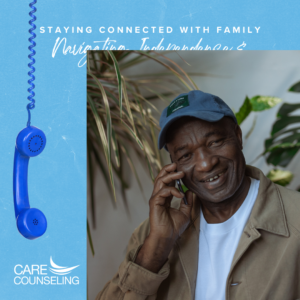Nurturing Family Relationships During College
 Transitioning from high school to college is an exciting journey filled with new experiences, opportunities, and challenges. Amidst the whirlwind of change, it’s important to remember the significance of family connections. Maintaining healthy relationships with your family while embracing newfound independence is a delicate balance that can greatly enrich your college experience.
Transitioning from high school to college is an exciting journey filled with new experiences, opportunities, and challenges. Amidst the whirlwind of change, it’s important to remember the significance of family connections. Maintaining healthy relationships with your family while embracing newfound independence is a delicate balance that can greatly enrich your college experience.
Embrace Open Communication
1. Prioritize Communication:
Make a conscious effort to stay in touch with your family regularly. Even a simple text, call, or video chat can bridge the gap and remind your loved ones that you care.
- Set Expectations:
Discuss your expectations and boundaries with your family regarding communication frequency and methods. This can help prevent misunderstandings and ensure that everyone is on the same page.
- Share Experiences:
Keep your family involved in your college journey by sharing your experiences, achievements, challenges, and memorable moments. Sharing your stories can help your family feel connected and included in your new life.
- Listen Actively:
While sharing your experiences is important, also take the time to actively listen to your family’s stories and updates. Showing interest in their lives reinforces the sense of connection.
Balance Independence and Family Time
- Designate Quality Time:
Set aside specific times for family interactions. Whether it’s a weekly video call, a weekend visit, or a shared meal, dedicating quality time to connect can help maintain strong bonds.
- Create Rituals:
Establishing family rituals or traditions, even from a distance, can help foster a sense of continuity and shared experiences. This could be a weekly movie night, a virtual game night, or a regular family update email.
- Include Them in Your Journey:
Involve your family in your college experience by inviting them to attend events, performances, or presentations when possible. Their virtual or physical presence can be a source of motivation and support.
- Plan Visits:
Whenever feasible, plan visits to your family’s home or invite them to your college campus. These visits allow you to catch up, create memories, and share a glimpse of your new life.
Navigate Conflict with Understanding
- Understand Changes:
Acknowledge that both you and your family are changing this transition. Be patient with each other as you adapt to new roles and dynamics.
- Communicate Boundaries:
If certain topics trigger tension, communicate your boundaries respectfully. Openly discussing areas of sensitivity can help prevent conflicts and maintain a positive atmosphere.
- Seek Resolution:
In the event of disagreements, focus on finding resolutions rather than assigning blame. Approaching conflicts with empathy and a willingness to understand each other’s perspectives can strengthen your relationships.
Practice Gratitude
- Express Appreciation:
Regularly express gratitude for the support your family provides. Acknowledge the sacrifices they’ve made to enable your education and growth.
- Share Achievements:
Celebrate your accomplishments with your family, whether they’re big or small. Sharing your successes reinforces the sense of shared pride and achievement.
- Reminisce:
Reflect on fond memories and experiences you’ve shared with your family in the past. These shared reminiscences can reinforce your connection and strengthen your bond.
- Keep Them Informed:
Update your family on your academic progress, extracurricular activities, and personal growth. Sharing your achievements and challenges helps them feel involved in your development.
Navigating the path of increased independence while staying connected with your family is a valuable skill that can enhance your college experience. By prioritizing open communication, balancing your independence with family time, navigating conflicts with empathy, and expressing gratitude, you can maintain and nurture your family relationships even as you embrace your new chapter. Remember, your family’s support and love are constants in your journey, providing a strong foundation that empowers you to thrive academically and personally. As you continue to grow and evolve, let your family be a source of inspiration, encouragement, and unwavering support.



























